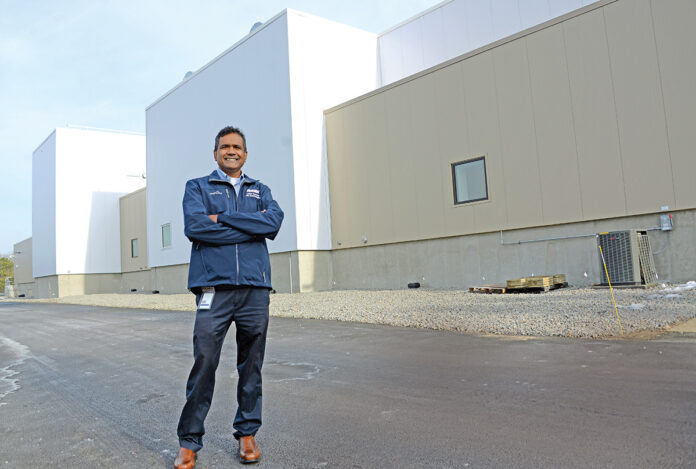The cargo that arrived in 2019 at the Port of Davisville in North Kingstown from overseas was something that had never been shipped to the United States: Three shiploads of modular pieces and parts that when fully assembled would create a state-of-the-art “next-generation” biomanufacturing factory.
The 120,000-square-foot structure had been mostly constructed in Shanghai, then dissembled, placed on cargo ships and sent to Rhode Island. Final destination? The Amgen Rhode Island campus in West Greenwich.
More than a year later and amid the COVID-19 pandemic, the $200 million biomanufacturing plant – the first of its kind in the United States – is complete, nearly ready to add to the capabilities of Amgen’s West Greenwich location, where the multinational biopharmaceutical company produces the popular arthritis drug Enbrel and other “biologic” medications.
Amgen Inc., based in Thousand Oaks, Calif., has touted the innovative, modular design of the new facility as highly flexible, enabling Amgen to boost its production of multiple medicines with equipment that is portable, smaller and disposable, allowing the company to quickly respond to changing demand and needs.
Rhode Island economic-development officials are more interested in other benefits.
Amgen has said it will hire about 150 people to staff the new plant, adding to the approximately 675 employees who already work at the West Greenwich campus. And the new jobs will pay well, offering a median annual salary of $77,000, according to state data.
“Amgen has options around the globe as to where to build a next-generation facility such as this,” R.I. Commerce Corp. spokesman Brian Hodge told Providence Business News. “We are proud they chose Rhode Island.”
TIPPING SCALES
Indeed, in the initial planning stages, Amgen had looked at other building sites, including some overseas, but changes to the U.S. tax code in recent years made setting up manufacturing facilities in the U.S. more advantageous.
Company executives told state leaders in 2018 that Rhode Island’s educated workforce, training opportunities and the success of the existing Rhode Island facility were factors that tipped the scales toward West Greenwich as they weighed potential locations in the U.S.
Rhode Island tipped them further when Commerce officials approved up to $3.5 million in Rebuild Rhode Island tax credits and an additional $6 million in Qualified Jobs tax credits spread over 10 years, with credits only being issued after new employees have paid income tax for a year.
On top of that, Amgen received exemptions on sales and use taxes due on construction materials and furnishings. The value of those exemptions was estimated to be about $3.3 million.
To R.I. Commerce, sweetening the pot was well worth it. The state calculated that the economic impact far outweighed the cost of the incentives – with an estimated $33.5 million increase in the state’s annual gross domestic product by the fourth year of operation and a $16.6 million increase in personal income, sales and business taxes revenue over 12 years, beginning with the construction of the facility.
LONG JOURNEY
Even before Amgen made its final decision on West Greenwich, the plant’s modular construction – a process in which it’s built off-site under controlled conditions in modules that can be pieced together later – allowed for 80% of the structure to be built in Shanghai by Japanese company Morimatsu.
“That gave us some advantage,” said Rohan Persaud, plant manager and executive director of Amgen Rhode Island. “We were able to do the proper due diligence to select a site, but at the same time we were building this plant [overseas].”
Once the company settled on West Greenwich as the location for the new plant in April 2018, the hard work began.
Amgen prepped the site in the northern corner of the Amgen property off Interstate 95 for a year while the modules were constructed in China. The design was based on a “next-generation” biomanufacturing plant the company had constructed in Singapore in 2014.
When it came time to transport the disassembled factory from Shanghai in July 2019, that process came with its own set of challenges.
It took three shipments to get all the parts of the facility to the port in North Kingstown. The last 10-mile leg of the trip to West Greenwich was also tricky, at least initially, Persaud said. It took 150 tractor trailer loads to get the modules to the site, and company officials wanted to ensure expensive technology and components weren’t sitting exposed on trucks in rush-hour traffic.
“There was detail planning around the truck routes,” Persaud said. “We had to ensure full clearance for the routes, then coordinated travel between 1 a.m. and 6 a.m.to minimize any disruptions to traffic. Once this was completed, the transport was smooth.”
Construction was overseen by Jacobs Engineering Group Inc., in Providence, with about 275 workers assembling the modules. When the COVID-19 pandemic arrived in March during the final phases of the project, it made construction difficult because of the precautions that had to be implemented, such as taking temperatures of workers as they arrived on the work site.
“Our focus has always been safety for everybody that comes through our gates, so we worked very closely with the construction group,” Persaud said. That included ensuring that workers followed social distancing and wore masks. “We never put schedule over safety. Safety was always our No. 1 priority.”
Now that Amgen has finished the modular construction in West Greenwich, the experience will be useful in the future, according to Peter Rodriguez, executive director plant manager at Amgen Rhode Island. “If we want to go somewhere else and build another facility, that design has already been completed, and we’ll compress and every time we do this, we’ll be able to do this faster,” he said.
“Think about a factory that’s built in a way that you can assemble it, then disassemble it and break it into trailer pads,” he said. “So you need to be able to fit those trailers onto the roads, so that’s accounted for, and then when you get to your location, you can actually run these trucks so that they make it to the facility.”
GROWING PRESENCE
This is the latest expansion for Amgen Rhode Island since its original West Greenwich plant was licensed by the U.S. Food and Drug Administration in 2005.
Since then, the company says it has invested more than $1.5 billion in its Rhode Island site, adding manufacturing, administrative and laboratory space. Over the years, the West Greenwich site has gone from producing one product to making about 12 commercial and clinical products.
Amgen says the Rhode Island facility is now one of the world’s largest producers of biologic medicines, which are made from substances found in living things such as mammalian protein instead of chemically synthesized like conventional drugs.
The new plant would produce biologic products, some of which already would be approved for use, while others would be in the approval pipeline. Tara Urban, senior manager of corporate affairs, declined to provide more detail.
The facility has been brought online for initial production runs of biologics, the data from which will be submitted to the U.S. Food and Drug Administration for review. Product approval for use by consumers could happen by early 2022.
Features of the modular structure include a 45,000-square-foot clean room and 40,000-square-foot utility room. And its use of portable, smaller and disposable equipment allows the company to be more nimble when it comes to production needs, eliminating expensive and time-consuming retrofitting that happens in standard pharmaceutical plants.
“The goal is to be able to handle anything that comes in, whatever mode of development,” said Brian Britson, Amgen Rhode Island vice president of site operations. “We have multiple … product platforms, and so we want to have the ability to manufacture products. So, this gives us that diversity here in Rhode Island to handle a wide [variety] of products that come down the project pipeline.”
The workers at Amgen also benefit.
“For the team here, it’s an amazing opportunity for them to get trained and cross-trained and develop a truly agile workforce,” said Rodriguez. “It can really help for us to provide for this team training and capabilities that can be unique and definitely help them to continue to grow their careers and figure out different exciting ways to grow.”
West Greenwich Town Administrator Kevin Breene has no complaints about Amgen, one of the town’s largest taxpayers. In fact, the town did its part to persuade Amgen to build its new facility in town by agreeing to a tax-stabilization incentive valued at $180,000.
“They require very few services, and we’ve had a good relationship straight through with them,” Breene said.
[gallery link="file" size="medium" td_select_gallery_slide="slide" ids="354872,354873,354874,354875"]













